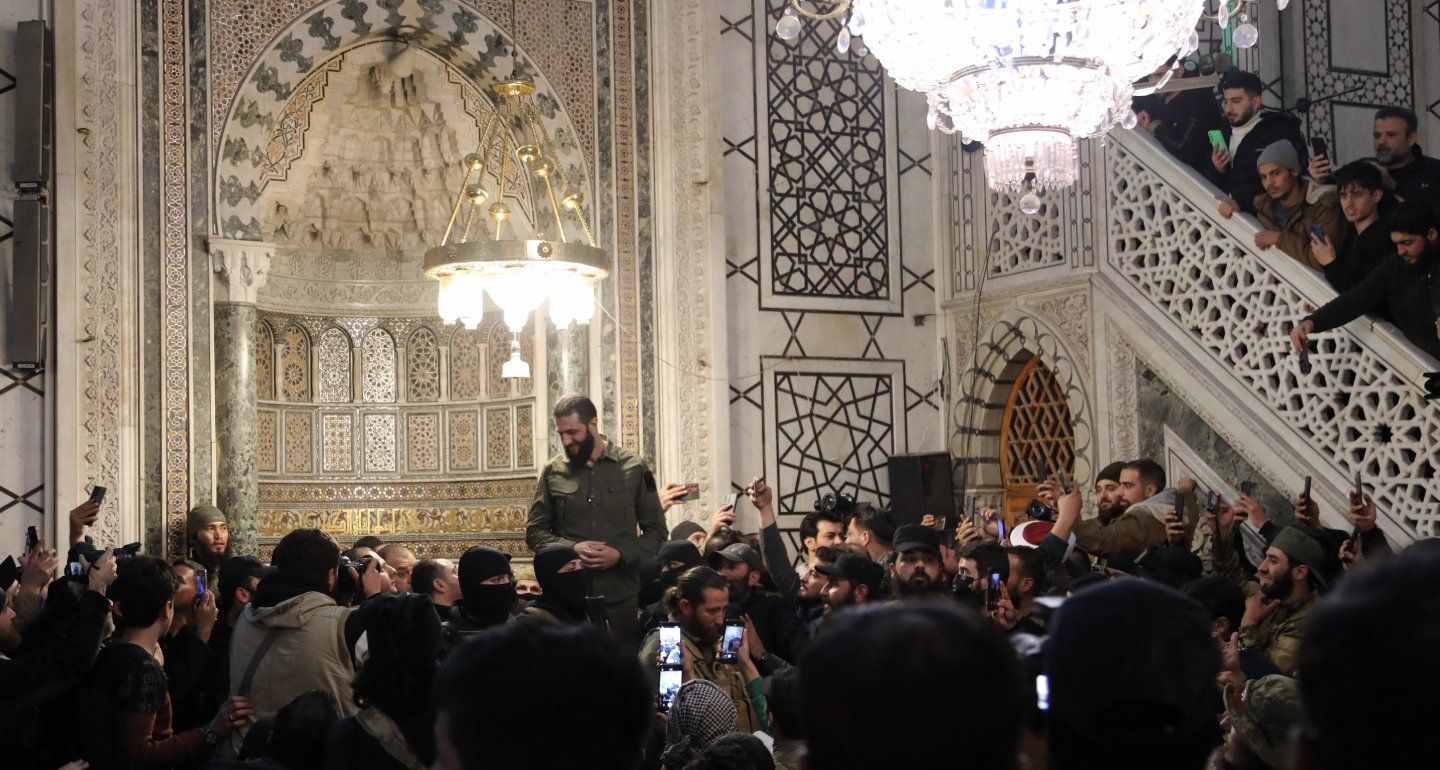Unexpectedly, Trump’s America appears to have replaced Putin’s Russia’s as the world’s biggest disruptor.
Alexander Baunov
{
"authors": [
"Nikita Smagin"
],
"type": "commentary",
"blog": "Carnegie Politika",
"centerAffiliationAll": "",
"centers": [
"Carnegie Endowment for International Peace",
"Carnegie Russia Eurasia Center"
],
"englishNewsletterAll": "",
"nonEnglishNewsletterAll": "",
"primaryCenter": "Carnegie Russia Eurasia Center",
"programAffiliation": "",
"programs": [],
"projects": [],
"regions": [
"Russia",
"Syria",
"Middle East"
],
"topics": [
"Foreign Policy",
"Military",
"Security",
"Global Governance"
]
}
The Kremlin could offer support and international legitimacy to the new rulers in Damascus in exchange for being allowed to keep its military bases in the country.
The fall of the Syrian regime has been a major blow to Russian interests in Syria: after all, the rebels now in power are the same ones Russia has been bombing for almost a decade. However, that does not mean the Kremlin’s foreign policy in the Middle East lies in tatters. There is even a scenario in which Russia can make a deal with Syria’s new government. With Russia well versed in reaching an accommodation with radicals all over the world, this is a much more likely outcome than it might first appear.
In recent years, it has become clear that Russia has big plans—both economic and political—for the Middle East. Moscow trades intensively with Türkiye, Iran, and the United Arab Emirates, is implementing large-scale energy and transport projects in the region, seeks a mediation role in local conflicts, and cooperates with pro-Iran groups tosqueeze the United States out of the region. In addition, Russia has not shied away from establishing relations with radical armed groups like theTaliban in Afghanistan and theHouthis in Yemen.
The loss of Syria threatens to thwart some of the Kremlin’s ambitions, as Moscow’s two military bases in the country are crucial for the logistics of power projection in the Middle East and Africa. It was this military presence, along with Moscow’s role in propping up Syrian President Bashar al-Assad’s regime in the 2010s, that compelled regional actors to take note.
Syria also remained a useful potential bargaining chip for Moscow in its relations with Washington. Even during the war in Ukraine, Russia’s military presence in the country gave Moscow leverage over both Türkiye and Israel (the lattersaid explicitly that it decided not to send arms to Ukraine because of the Russian bases). In other words, Syria is not just a reminder of past successes—the country remains a key part of Russia’s global plans.
Amid the uncertainty of the current transition in Damascus, Russian officials are focused on keeping the two military bases. Moscow has already reached out to the victorious rebels, whoprovided initial security guarantees, suggesting it has a reasonable chance of retaining the bases.
Of course, Moscow will need to agree on a form of long-term cooperation with those who, until recently, it was calling terrorists. But it has repeatedly shown extreme flexibility on such issues. The Taliban in Afghanistan, for example, were classified not so long ago as an illegal terrorist movement by Russia—yet now they’re a valued partner. A similar process is already underway in Syria. Within hours of the fall of Damascus, Russian state media switched to calling the rebels “Syria’s armed opposition” instead of a “terrorist group,” and the flag on the Syrian embassy in Moscow was replaced with that used by the opposition.
Admittedly, Hayat Tahrir al-Sham (HTS), Syria’s new rulers, may throw a spanner in the works. After all, Russian planes have been bombing the group’s positions for nine years. Russia’s chances of retaining a presence in Syria therefore depend on whether HTS really has transformed from a group of militants close to Al Qaeda into a pragmatic force that is open to compromise.
From a purely pragmatic perspective, HTS needs Russia just as much as Russia needs HTS. In particular, Moscow could provide the new Syrian authorities with much-needed international legitimacy, since it’s unlikely that Europe and the United States will be rushing to open embassies in Damascus, while the Kremlin has de facto already done so. (That is also how Russia’s recognition of the Taliban began.)
Russia could also be useful for HTS if it wants to become a truly independent group: thus far, its main international backer has been Türkiye, and it’s often considered a Turkish proxy. In order to come into its own, the group needs the support of as many external partners as possible. Even if HTS proves able to quickly formalize its relationship with Türkiye, Qatar, and the United Arab Emirates, recognition by a global power like Russia would help bestow international legitimacy.
In addition, Russia would be a far better counterweight to U.S. influence in Syria than Türkiye or the Gulf states. At the moment, the United States, which supports the Kurds and other tribal groups in northern and eastern Syria, is the biggest remaining obstacle to HTS’s ambition of ruling Syria in its entirety. Finally, when it comes to Israel—which is busydestroying all of Syria’s remaining weapons and equipment so they don’t fall into the hands of Islamist rebels—Russia could act as an intermediary.
Such a strategy of trying to trade international recognition of HTS in return for retaining military bases in Syria could lead Russia in two directions. Firstly, Moscow might opt to establish and provide military support for an Alawite autonomy in Syria’s Latakia (the Alawites fear the Islamists), where Russian bases are located. This would be similar to the way in which the United States has backed Syria’s Kurds, who currently control large tracts of the country’s north.
Second, the need to come to an agreement with HTS could push Russia into boosting cooperation with all kinds of radical groups globally. In this way, Russia might end up offering legitimacy to a whole range of radical groups who have seized power in countries across the world—bestowing legitimacy and extending material support in exchange for preferential treatment.
For some, Moscow’s decision to offerrefuge to Assad could even make such offers more convincing. It sends the message that if they lose power, yes, Moscow will reach an agreement with their successor—but it will also ensure that they and their family remain alive and unharmed. Who else in our turbulent world would provide such a guarantee?
Although the overthrow of Assad was a reversal for the Kremlin, it was not a total defeat for its policy in the Middle East. Even if Russia does end up losing its military bases in Syria, it still has closeeconomic ties with Türkiye and a special relationship with Iran, while a rapprochement is underway with both the Taliban and the Houthis. And if Russia does find a way to work with HTS—which is not beyond the realms of possibility—it will open up a range of new options, and perhaps hand the Kremlin a competitive advantage in the region.
Carnegie does not take institutional positions on public policy issues; the views represented herein are those of the author(s) and do not necessarily reflect the views of Carnegie, its staff, or its trustees.
Unexpectedly, Trump’s America appears to have replaced Putin’s Russia’s as the world’s biggest disruptor.

Alexander Baunov
Baku may allow radical nationalists to publicly discuss “reunification” with Azeri Iranians, but the president and key officials prefer not to comment publicly on the protests in Iran.

Bashir Kitachaev
The Kremlin will only be prepared to negotiate strategic arms limitations if it is confident it can secure significant concessions from the United States. Otherwise, meaningful dialogue is unlikely, and the international system of strategic stability will continue to teeter on the brink of total collapse.

Maxim Starchak
For years, the Russian government has promoted “sovereign” digital services as an alternative to Western ones and introduced more and more online restrictions “for security purposes.” In practice, these homegrown solutions leave people vulnerable to data leaks and fraud.

Maria Kolomychenko
Geological complexity and years of mismanagement mean the Venezuelan oil industry is not the big prize officials in Moscow and Washington appear to believe.

Sergey Vakulenko